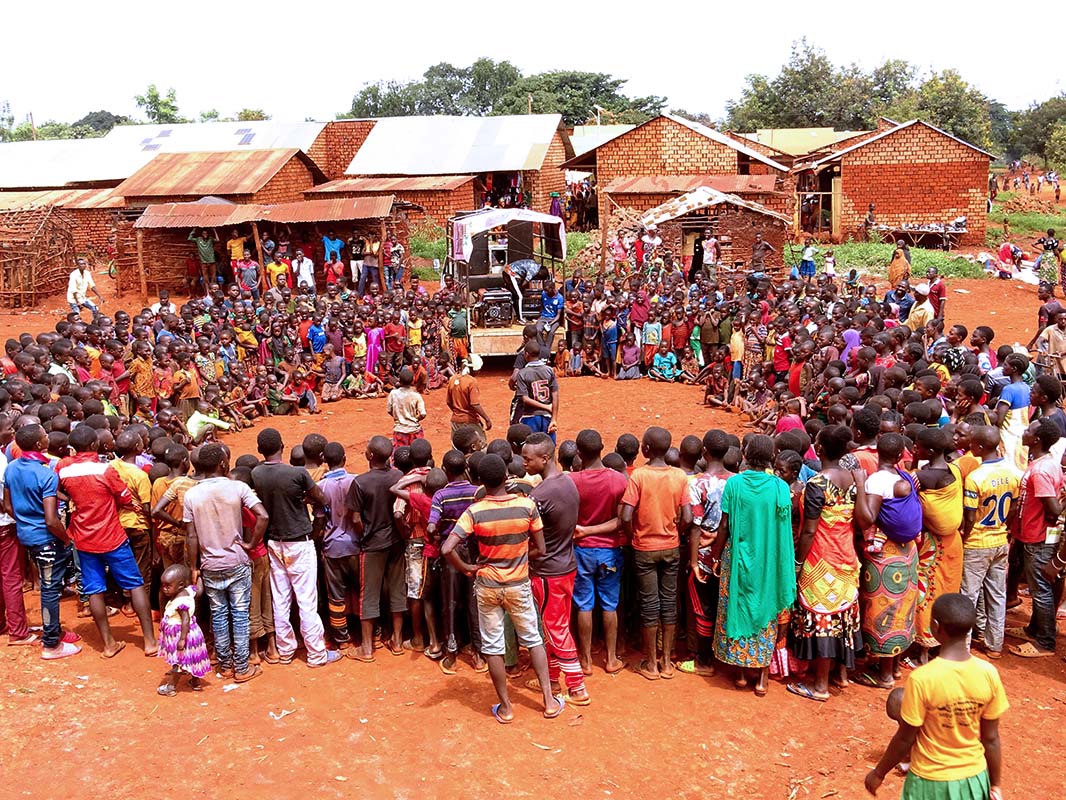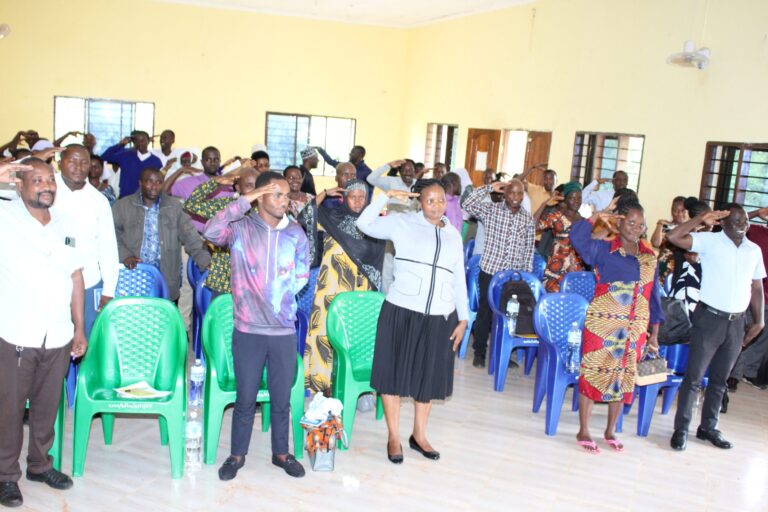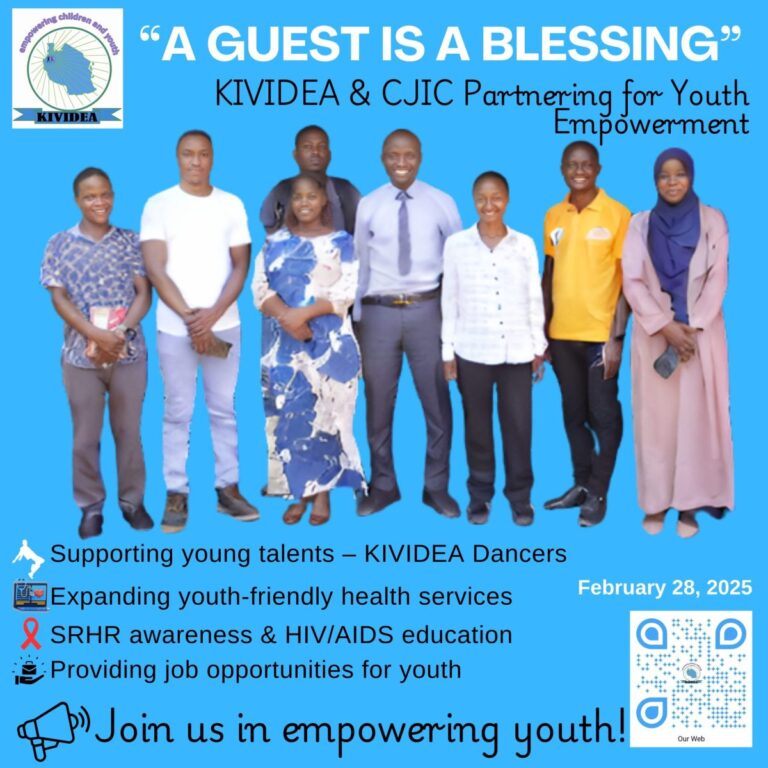Working methods / approaches to working.
- Peer to peer strategy: This strategy is used as a model to empower and support peer educators at ward level to facilitate educative/informative sessions with youth clubs in or out of schools as well as other youth interest groups that exist in the community
- Edutainment strategy: Through open community awareness campaigns, the organization conducts youth-led and youth-focused community awareness events. The campaigns involve sports events, entertainment groups and audiovisual materials to mobilize, sensitize and educate the communities on VAWG;
- Social and Behavior Change Communication strategy: This strategy enables the development of youth-focused IEC materials and their dissemination among target groups. Kividea also documents and disseminates evidences of VAWG and SRH and develop locally adapted materials to address them through diverse forums. Also, the organization encourages peer linking, sharing and learning among youth through social media (facebook, blog, twitter and instragram), where the youth will interact and build a voice.
- Instruments for team and organizational development.
We conduct special meetings in the form of group discussions with staff and board members to brainstorm on important organizational issues and agree appropriate intervention. The organization also uses the meetings with youth center committees to gather information that enable us to address key challenges within the organization. Most of these meetings are steered by the Program Manager who is the general coordinator of all projects and programs.
Although we have not yet applied regular standard staff evaluation, we do conduct participatory program evaluations with program staff and beneficiaries, and all observations are discussed in appropriate executive and board meetings. In this way, we see ourselves as an organization that is ever learning, self-critical and open to criticism.
- Dealing with Internal conflicts.
Conflicts do arise in KIVIDEA, but we have so far been able to contain them successfully. Conflicts are dealt with at three levels: the executive committee, the Board of governance and the Members’ Assembly. The executive committee will meet to address the conflict if related to staff members or people under specific programs. Problems related to members and senior staff are directly addressed by the Board of Governance before they are submitted to Members’ Assembly.
- Strengths and challenges of the organization.
After over 12 years or so of existence and working with youth, we believe that one of our strengths lays in our acceptability among the youth and the capacity to mobilize them. Another strength is our ability to maintain a large presence in the rural areas of Kigoma district, which gives us enough power to mobilize and influence actions for and with youth. This is readily recognized even by the local government authorities, at all levels. On the other hand, we have a strong community support, from both public authorities and other community leaders.
Youth involvement in our programs is no less a strength. We do not speak for the you, we let them take to lead for their own actions and give them both voice and choice. This has been the key to the success of our programs with youth in the region.
Lastly, we are a learning organization, open to criticism and advice; we maintain a high level of self-criticism for the purpose of change.
But we do have challenges as well. First, as an organization we have not attained financial sustainability to ensure the continuity of our programs and activities, which are generally funding based. We have not yet been able to develop strong internal sources of funds; therefore, we do not have adequate funding for our core/institutional costs. Moreover, despite our valuable experience in the field, many of our core staff still need to be developed in terms of programmatic capacities.
- Achievements and lessons learnt.
KIVIDEA proudly sees its achievements in the light of the Millennium Development Goals. The summary below gives a light on this:
- Eradicating extreme poverty and hunger:
Kividea provided about 150 youth with skills (vocational skills) to enable them to be economically productive; facilitating them to start income generating groups and support their initiatives with capital funds up to 8 million TZS. We have initiated a village irrigation scheme (2010-2011) intended to help over 300 youth engage in market agriculture activities. With support from the World Food program, Kividea managed to provide adequate nutrition (2 meals a day) to about 70 each year, up to 2013.
- Achieving universal primary education and universal health coverage
Kividea had a pre-school and day care centre that takes in between 50 – 70 children, among whom are orphans and vulnerable children in Kigoma town every year, and had provided financial and material support to over 80 children to access primary and secondary school in the last 8 years. currently, Kividea is supporting 120 Most vulnerable children to access primary, secondary in 4 wards of Uvinza district and 4 wards of Kigoma Municipal. About 528 MVC relatives benefit from health care services from the 8 wards in two councils.
- Promoting gender equity and empowering women:
We have so far reached as many as 8,260 adolescents and youth through the youth centers and school-based life skills and sexual and reproductive health programs. Between 2007 – 2009, our radio programs provided awareness on sexual and reproductive health and rights to about 70% of a population estimated at 1,679,109 people. Since 2012, we are engaged in safe motherhood advocacy project to reduce the toll of maternal death due to unsafe abortion and post-partum hemorrhage, and to promote access to contraception. Kividea has been also engaged in campaigning against gender violence and promotion of reproductive rights. Our Youth Empowerment project has helped 55 female youth victims of early motherhood to learn skills, regain self-value and become economically productive. Currently the organization is fully engaged in a project to fight against VAWG under the UN Joint Program for Kigoma region since 2018.
- Evaluation
We conduct both projects based and organizational annual evaluations and audits. However, organizational evaluations and audits were not always done in very standard way in the past. Project based evaluations and audits are done as part of specific projects and have involved independent evaluators. As an organization, we are committed to ensuring that are efficiently accountable and transparent to our partners.
- Cooperation with other partners.
KIVIDEA works well with local and national civil society organization. We are part of key regional networks, namely Kigoma-Kasulu NGO Network (KIKANGONET), Kigoma-Ujiji NGO Network (KIUNGO) and Kigoma Aids Control Network (KACON), KIVIDEA is currently working to expand its membership to other national networks and consortiums of NGOs for youth and development. In 2018, the organization was affiliated to the coalition in promoting Reproductive, Maternal, Newborn, Child Health program in eight low performing regions in Tanzania. The program is supervised by Health Promotion Tanzania (HDT) under support from Global Financing Facility (GFF).
We also have a strong cooperation with the regional secretariat, regional medical office and all district councils’ authorities and other local leaders. We use government human resources and expertise in our programs when necessary (such as training facilitators, health professionals, etc.) and receive the needed administrative support.
- Peer to peer strategy: This strategy is used as a model to empower and support peer educators at ward level to facilitate educative/informative sessions with youth clubs in or out of schools as well as other youth interest groups that exist in the community
- Edutainment strategy: Through open community awareness campaigns, the organization conducts youth-led and youth-focused community awareness events. The campaigns involve sports events, entertainment groups and audiovisual materials to mobilize, sensitize and educate the communities on VAWG;
- Social and Behavior Change Communication strategy: This strategy enables the development of youth-focused IEC materials and their dissemination among target groups. Kividea also documents and disseminates evidences of VAWG and SRH and develop locally adapted materials to address them through diverse forums. Also, the organization encourages peer linking, sharing and learning among youth through social media (facebook, blog, twitter and instragram), where the youth will interact and build a voice.
- Instruments for team and organizational development.
We conduct special meetings in the form of group discussions with staff and board members to brainstorm on important organizational issues and agree appropriate intervention. The organization also uses the meetings with youth center committees to gather information that enable us to address key challenges within the organization. Most of these meetings are steered by the Program Manager who is the general coordinator of all projects and programs.
Although we have not yet applied regular standard staff evaluation, we do conduct participatory program evaluations with program staff and beneficiaries, and all observations are discussed in appropriate executive and board meetings. In this way, we see ourselves as an organization that is ever learning, self-critical and open to criticism.
- Dealing with Internal conflicts.
Conflicts do arise in KIVIDEA, but we have so far been able to contain them successfully. Conflicts are dealt with at three levels: the executive committee, the Board of governance and the Members’ Assembly. The executive committee will meet to address the conflict if related to staff members or people under specific programs. Problems related to members and senior staff are directly addressed by the Board of Governance before they are submitted to Members’ Assembly.
- Strengths and challenges of the organization.
After over 20 years or so of existence and working with youth, we believe that one of our strengths lays in our acceptability among the youth and the capacity to mobilize them. Another strength is our ability to maintain a large presence in the rural areas of Kigoma district, which gives us enough power to mobilize and influence actions for and with youth. This is readily recognized even by the local government authorities, at all levels. On the other hand, we have a strong community support, from both public authorities and other community leaders.
Youth involvement in our programs is no less a strength. We do not speak for the you, we let them take to lead for their own actions and give them both voice and choice. This has been the key to the success of our programs with youth in the region.
Lastly, we are a learning organization, open to criticism and advice; we maintain a high level of self-criticism for the purpose of change.
But we do have challenges as well. First, as an organization we have not attained financial sustainability to ensure the continuity of our programs and activities, which are generally funding based. We have not yet been able to develop strong internal sources of funds; therefore, we do not have adequate funding for our core/institutional costs. Moreover, despite our valuable experience in the field, many of our core staff still need to be developed in terms of programmatic capacities.
- Achievements and lessons learnt.
KIVIDEA proudly sees its achievements in the light of the Millennium Development Goals. The summary below gives a light on this:
- Eradicating extreme poverty and hunger:
Kividea provided about 150 youth with skills (vocational skills) to enable them to be economically productive; facilitating them to start income generating groups and support their initiatives with capital funds up to 8 million TZS. We have initiated a village irrigation scheme (2010-2011) intended to help over 300 youth engage in market agriculture activities. With support from the World Food program, Kividea managed to provide adequate nutrition (2 meals a day) to about 70 each year, up to 2013.
- Achieving universal primary education and universal health coverage
Kividea had a pre-school and day care centre that takes in between 50 – 70 children, among whom are orphans and vulnerable children in Kigoma town every year, and had provided financial and material support to over 80 children to access primary and secondary school in the last 8 years. currently, Kividea is supporting 120 Most vulnerable children to access primary, secondary in 4 wards of Uvinza district and 4 wards of Kigoma Municipal. About 528 MVC relatives benefit from health care services from the 8 wards in two councils.
- Promoting gender equity and empowering women:
We have so far reached as many as 8,260 adolescents and youth through the youth centers and school-based life skills and sexual and reproductive health programs. Between 2007 – 2009, our radio programs provided awareness on sexual and reproductive health and rights to about 70% of a population estimated at 1,679,109 people. Since 2012, we are engaged in safe motherhood advocacy project to reduce the toll of maternal death due to unsafe abortion and post-partum hemorrhage, and to promote access to contraception. Kividea has been also engaged in campaigning against gender violence and promotion of reproductive rights. Our Youth Empowerment project has helped 55 female youth victims of early motherhood to learn skills, regain self-value and become economically productive. Currently the organization is fully engaged in a project to fight against VAWG under the UN Joint Program for Kigoma region since 2018.
- Evaluation
We conduct both projects based and organizational annual evaluations and audits. However, organizational evaluations and audits were not always done in very standard way in the past. Project based evaluations and audits are done as part of specific projects and have involved independent evaluators. As an organization, we are committed to ensuring that are efficiently accountable and transparent to our partners.
- Cooperation with other partners.
KIVIDEA works well with local and national civil society organization. We are part of key regional networks, namely Kigoma-Kasulu NGO Network (KIKANGONET), Kigoma-Ujiji NGO Network (KIUNGO) and Kigoma Aids Control Network (KACON), KIVIDEA is currently working to expand its membership to other national networks and consortiums of NGOs for youth and development. In 2018, the organization was affiliated to the coalition in promoting Reproductive, Maternal, Newborn, Child Health program in eight low performing regions in Tanzania. The program is supervised by Health Promotion Tanzania (HDT) under support from Global Financing Facility (GFF).
We also have a strong cooperation with the regional secretariat, regional medical office and all district councils’ authorities and other local leaders. We use government human resources and expertise in our programs when necessary (such as training facilitators, health professionals, etc.) and receive the needed administrative support.



